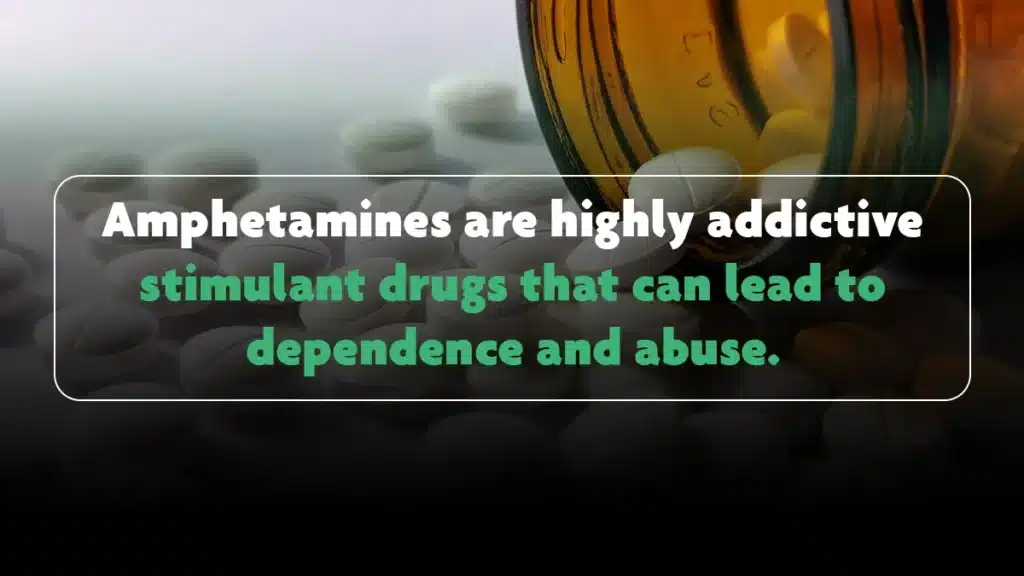Assessing Addictiveness of Amphetamines
Amphetamines, a class of powerful stimulant drugs, have long been employed for various medical purposes, including treating attention deficit hyperactivity disorder (ADHD) and narcolepsy. However, their potential for addiction raises critical questions about their safety and usage.
Despite their therapeutic benefits, misuse or prolonged use can result in tolerance, dependence, and addiction.
Understanding the addictive potential of amphetamines is necessary for both medical professionals and the general public to navigate the delicate balance between therapeutic benefits and the inherent risks associated with these potent substances.
Key Takeaways
The risk of addiction is heightened when amphetamines are used recreationally or without proper medical supervision. Here’s what you need to know:
- Amphetamines are highly addictive stimulant drugs that can lead to dependence and abuse.
- Prolonged use of amphetamines may result in tolerance, requiring higher doses for the same effects.
- Abruptly stopping amphetamine use can result in withdrawal symptoms and life-threatening conditions.
Contact us at (845) 479-6888 for information and medical assistance to help your child foster long-term recovery and growth.
Understanding Amphetamines

Amphetamines are a class of psychoactive substances known for their stimulant effects on the central nervous system. They enhance the release of neurotransmitters like dopamine and norepinephrine, resulting in increased alertness and energy.
Commonly prescribed for conditions like attention deficit hyperactivity disorder (ADHD) and narcolepsy, amphetamines, such as Adderall and Dexedrine, can improve focus and attention. However, they also have a high potential for abuse due to their euphoric effects.
History of Amphetamine Use: The history of amphetamine use dates back to the early 20th century when amphetamine was first synthesized. In the 1930s, amphetamines gained popularity for their stimulating effects, and they were used to enhance performance and combat fatigue during World War II.
In subsequent decades, recreational use rose, leading to increased regulation. Despite their medicinal value, the history of amphetamines is marked by a complex interplay of medical, social, and regulatory factors, reflecting their dual nature as both therapeutic agents and substances with abuse potential.
How Amphetamines Work: Amphetamines function as central nervous system stimulants, primarily influencing the release and reuptake of neurotransmitters, such as dopamine and norepinephrine. Upon ingestion, amphetamines enter nerve terminals, prompting the release of these neurotransmitters into synapses.
This heightened neurotransmitter activity increases alertness, mood, and cognitive function. Additionally, amphetamines inhibit the reuptake of these neurotransmitters, prolonging their effects and intensifying their impact on the brain.
Why Are They Addictive: Amphetamines pose a risk of addiction due to their ability to modulate the brain’s reward system. The amplified release of dopamine, a neurotransmitter associated with pleasure and reward, creates a reinforcing feedback loop.
People may experience a sense of euphoria and heightened energy, making them more likely to seek out the substance repeatedly. Over time, the brain adapts to the increased dopamine levels, leading to tolerance and needing higher doses to achieve the desired effects.
Furthermore, prescription amphetamine use can result in neurobiological changes, impacting areas related to self-control and decision-making.
According to studies by the National Institute of Drug and Medicine, the combination of enhanced euphoria and neuroadaptations contributes to the development of dependence and addiction, as people find it challenging to discontinue use despite adverse consequences.
Signs and Symptoms of Amphetamine Addiction
Amphetamine addiction can have both physical and psychological signs and symptoms. It’s important to note that the severity and manifestation of these signs can vary among individuals.
Here are some common signs of amphetamine abuse:
Physical Signs
- Increased Energy and Alertness: Individuals dependent on drug use due to various reasons may exhibit unusually high levels of energy and alertness.
- Decreased Appetite and Weight Loss: Amphetamine use can suppress appetite, leading to significant weight loss over time.
- Insomnia or Disturbed Sleep Patterns: Difficulty in falling asleep or staying asleep is a common physical symptom of amphetamine addiction.
- Hyperactivity: Excessive physical activity, restlessness, and fidgeting may be observed.
- Increased Heart Rate and Blood Pressure: Amphetamines can stimulate the cardiovascular system, leading to an increased heart rate and elevated blood pressure.
- Dilated Pupils: Enlarged pupils are a physical sign that may be noticeable in individuals using amphetamines.
- Excessive Sweating: Increased perspiration, even in non-strenuous situations, can be a sign of drug abuse.
- Dental Issues: Bruxism (teeth grinding) and other dental problems may occur due to the physical effects of amphetamines.
Psychological Signs
- Euphoria: A heightened sense of pleasure or euphoria is a common psychological effect of amphetamine use.
- Increased Confidence: People may experience a boost in self-confidence and feelings of invincibility.
- Agitation and Irritability: Amphetamine tablet use can lead to increased irritability, mood swings, and a generally agitated demeanor.
- Paranoia: People may become excessively suspicious or paranoid, experiencing unfounded fears or anxieties.
- Impulsivity: Impulsive behavior, such as making rash decisions without considering consequences, may be evident.
- Poor Concentration: Despite the stimulant effects, long-term amphetamine use can lead to difficulties in concentration and focus.
- Depression and Anxiety: Individuals may experience depressive episodes and heightened anxiety during periods of amphetamine use or withdrawal.
- Psychosis: In severe cases, prolonged use of prescription amphetamines may lead to symptoms of psychosis, including hallucinations and delusions.
Dangers of Amphetamine Addiction
However, when abused or used recreationally, amphetamine addiction can pose serious risks and dangers.
Here are some of the potential dangers associated with amphetamine addiction.
Short-term Effects: Amphetamine use triggers immediate physiological and psychological changes, leading to heightened alertness, increased energy, and a sense of euphoria. However, these short-lived benefits come at a cost.
People often experience elevated heart rates, high blood pressure, and insomnia. The initial burst of energy can also result in increased risk-taking behavior, agitation, and anxiety.
Long-term Consequences: Long-term use of amphetamines can cause serious and lasting health problems. If someone uses these club drugs for a long time, they may need higher doses to feel the same effects, which increases the risk of overdose.
Using different types of amphetamines for a prolonged period can harm the heart and lead to issues like high blood pressure and heart disease. Mental health can also suffer, as addiction can worsen or trigger anxiety and depression.
Moreover, thinking abilities can decline, affecting memory and decision-making. Long-term use can also harm relationships and job stability, posing a big threat to well-being. It’s important to understand the risks associated with prolonged amphetamine use.
Frequently Asked Questions (FAQ)
Do amphetamines carry a risk of physical dependence or addiction?
Amphetamines, including prescription stimulants, carry a risk of physical dependence and addiction. Warning signs of amphetamine abuse include strong cravings, withdrawal symptoms, and health problems.
In addition, treatment options, including detox, medication-assisted treatment, support groups, and behavioral therapies, can help to treat substance use disorders. Seek a doctor’s guidance for proper dosage and recovery.
What are the side effects of amphetamines?
Amphetamines, whether in prescription pills or recreational drugs like speed or MDMA, may cause serious health problems such as heart attacks. Individuals experiencing strong cravings or symptoms of amphetamine abuse should seek professional help from health professionals or treatment centers.
Family members should encourage recovery and consult with a physician about amphetamine dependence and other medical conditions.
How do amphetamines affect your mental health?
Amphetamines, including prescription stimulants, impact mental health and physical well-being. Abuse may lead to heart problems and exacerbate mental illness symptoms.
Seeking professional help is crucial for those facing drug use problems. Health professionals, including medical professionals, can address health conditions associated with stimulant drugs.
Guiding Teens Rise Above Addiction
Take the first step towards reclaiming your teen’s future from Amphetamine addiction with our dedicated teen drug rehab.
Our residential treatment facility prioritizes holistic healing, utilizing art and music therapy to foster creative expression and emotional release. Our experienced counselors provide personalized support, addressing the root causes of addiction through one-on-one sessions.
In addition, our educational workshops create an environment where teens feel understood and motivated to embrace positive change.
Trust us to be the beacon of hope on your teen’s journey to recovery. Contact us at (845) 479-6888 today for more information.


